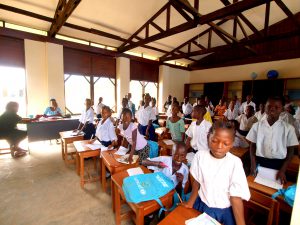GANTA–The first grade class at Ganta’s new child-friendly school recites multiplication tables as teacher’s assistant Mary Seway paces through the neat rows of tiny chairs and desks. At this school – the first of its kind in Liberia– children are the primary focus.
 Seway, a 45-year-old teaching veteran, said the approach allows more teacher-student interaction. “The difference between this school and other schools I have taught is that we focus on a child, unlike other schools where the classes are packed and no focus is on the children,” Seway said.
Seway, a 45-year-old teaching veteran, said the approach allows more teacher-student interaction. “The difference between this school and other schools I have taught is that we focus on a child, unlike other schools where the classes are packed and no focus is on the children,” Seway said.
The school, which sits on a leafy, 25-acre parcel near the center of the city, boasts a computer lab, a mobile clinic for students and the community, a radio network and a performance space where grades take the stage in turns, amenities that are all but unknown in Liberia’s interior. Powered by solar panels, all waste is converted into food for sunflowers and banana trees. The $1 million campus was designed by Australian architect Finley Pitt and and paid for by the United Nations Children’s Education Fund.
The concept of the child-friendly school is to promote peace in post war countries, Pitt said. “The aspiration was to bring a new development for a new beginning, for the beginning of a new peace in Liberia. The architecture does address a new beginning and the cementing of the peace process,” she said. Child-friendly schools are planned in Guinea, Sierra Leone and Ivory Coast, in border regions troubled by civil conflict.
“The idea is for the school to be spreading messages of peace, where a lot of interchanging of people would take place but not exchanging of guns,” said Stella Kaabwe, UNICEF’s head of education in Liberia.
The school, which opened last September, has drawn more students than its 400-student capacity allows as parents in Ganta clamor to enroll their children. But teachers are already leaving the school after not receiving pay, threatening an ambitious program to roll out six more child-friendly schools in five counties by the end of 2012.
“If the government cannot take care of the teachers of this one school, what will happen to the six other schools that UNICEF intends to build in the future?” Kaabwe asked.
While UNICEF foots the bill for construction of the school in Ganta, the government is responsible for teacher salaries and maintenance.
Mr. Mike E. McCrownsey, the Ministry of Education’s director of personnel, said the Ganta teachers were not included in the budget that was recently passed so the teachers would have to wait until the next budgetary period in the fall. USAID budgeted $4 million for the teachers, but the money has not yet been released, McCrownsey said. “The system is very slow so that some teachers will have to wait up to a year before their names are added on the payroll. Therefore many teachers who can’t afford to wait that long will leave,” he said.
USAID is working closely with the financial management unit of the Ministry of Finance, as well as the Ministry of Education, to ensure the accurate payment of thousands of teachers, according to Justin Prud’homme, a USAID communications specialist.
He said following a country-wide enumeration of Ministry of Education staff conducted in the first part of 2010, the Ministry has been working to produce a revised and accurate personnel listing that will allow for the more accurate recruitment, placement, management, and compensation of Ministry teachers. “Part of this ongoing challenge is the confirmation and removal of ghost names from the payroll, while keeping the names of actual teachers on the payroll,” he said.
After the final tranche of the $4 million is disbursed, USAID will not be providing further funding for the payment of teacher salaries.
Earlier this month a student demonstrated in Ganta after teachers and staff at the school laid down their chalk. There are 36 administrators and teachers who have not been paid since September, said Oswer Gbengan, the school’s principal. “They are living on hope, but how long can they go on for?” he said.
Teacher pay has long been a problem among Liberia’s free government schools. Students of government schools took to the streets of Monrovia in late March after teachers staged a strike in an effort to win a raise. After a bloody clash with police, twenty-five students were hospitalized.
In 1985, public school students whose teachers had gone on strike took to the streets in Monrovia and vandalized private schools and government officials’ residences out of anger that their private school counterparts were receiving education denied to them because of the perennial issue of teacher pay. Later that day, riot police were sent to disburse the crowd, leaving dozens of students injured.
Back on the campus of the child-friendly school in Ganta, students say they enjoy that their classes stretch to 2:30 p.m. and that the classrooms are not overcrowded. “I understand the lesson because they take their time to teach us and we have the chance to take in more,” said eighth-grade student Emanuel G.S. Young, 15.
